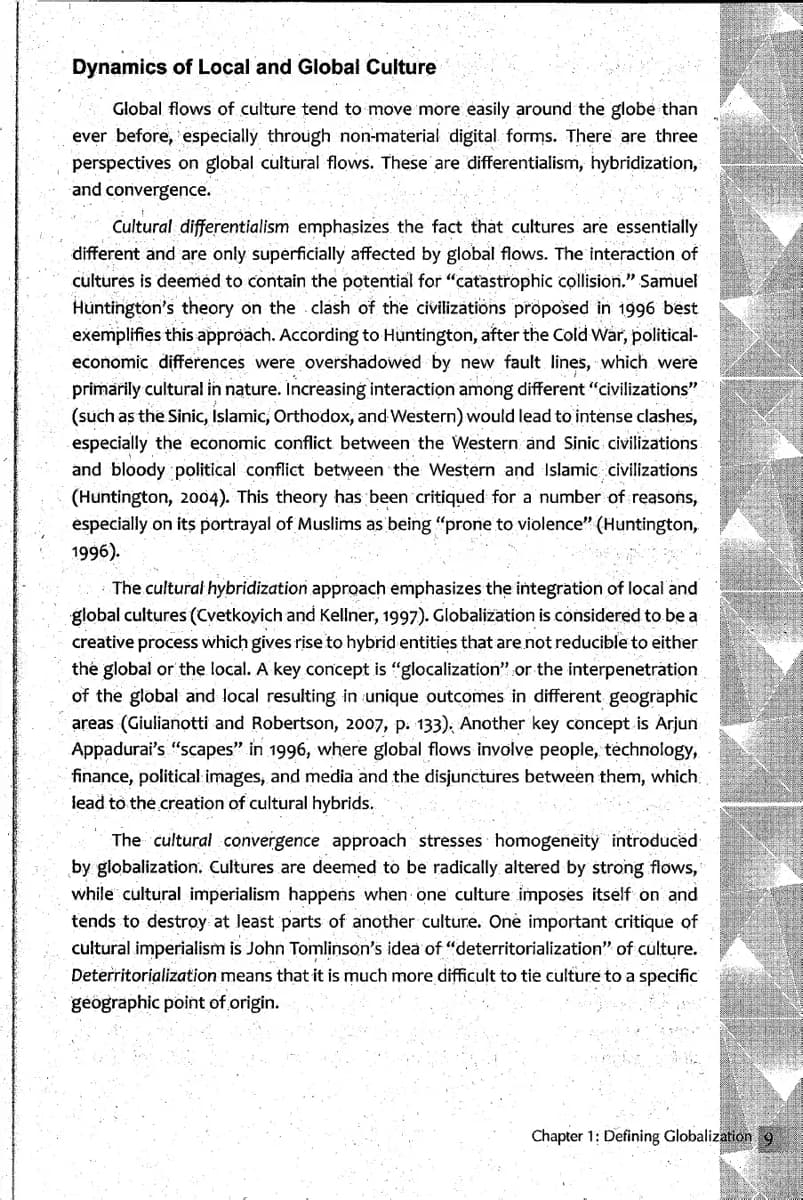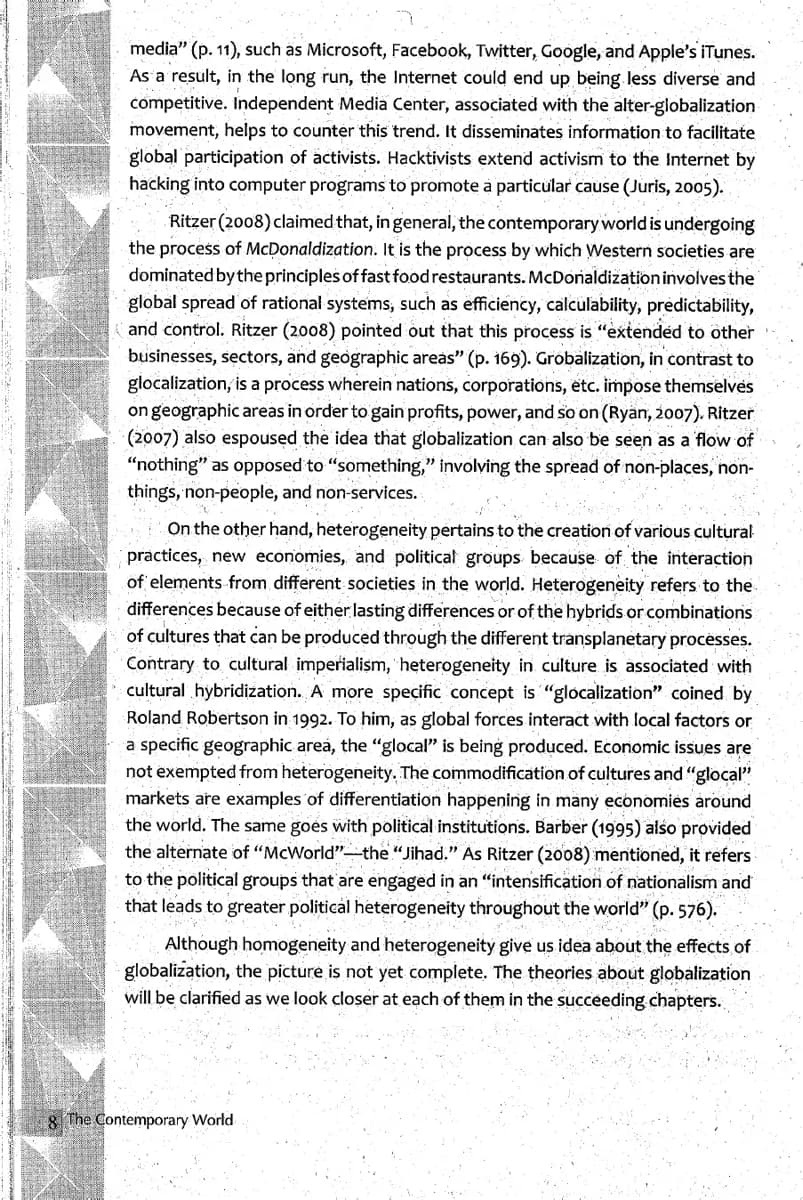Contemporary world Explain and give me an examples
Social Psychology (10th Edition)
10th Edition
ISBN:9780134641287
Author:Elliot Aronson, Timothy D. Wilson, Robin M. Akert, Samuel R. Sommers
Publisher:Elliot Aronson, Timothy D. Wilson, Robin M. Akert, Samuel R. Sommers
Chapter1: Introducing Social Psychology
Section: Chapter Questions
Problem 1RQ1
Related questions
Question
Contemporary world
Explain and give me an examples

Transcribed Image Text:Dynamics of Local and Global Culture
Global flows of culture tend to move more easily around the globe than
ever before, especially through non-material digital forms. There are three
perspectives on global cultural flows. These are differentialism, hybridization,
and convergence.
Cultural differentialism emphasizes the fact that cultures are essentially
different and are only superficially affected by global flows. The interaction of
cultures is deemed to contain the potential for "catastrophic collision." Samuel
Huntington's theory on the clash of the civilizations proposed in 1996 best
exemplifies this approach. According to Huntington, after the Cold War, political-
economic differences were overshadowed by new fault lines, which were
primarily cultural in nature. Increasing interaction among different "civilizations"
(such as the Sinic, Islamic, Orthodox, and Western) would lead to intense clashes,
especially the economic conflict between the Western and Sinic civilizations
and bloody political conflict between the Western and Islamic civilizations
(Huntington, 2004). This theory has been critiqued for a number of reasons,
especially on its portrayal of Muslims as being "prone to violence" (Huntington,
1996).
The cultural hybridization approach emphasizes the integration of local and
global cultures (Cvetkovich and Kellner, 1997). Globalization is considered to be a
creative process which gives rise to hybrid entities that are not reducible to either
the global or the local. A key concept is "glocalization" or the interpenetration
of the global and local resulting in unique outcomes in different geographic
areas (Giulianotti and Robertson, 2007, p. 133). Another key concept is Arjun
Appadurai's "scapes" in 1996, where global flows involve people, technology,
finance, political images, and media and the disjunctures between them, which
lead to the creation of cultural hybrids.
The cultural convergence approach stresses homogeneity introduced
by globalization. Cultures are deemed to be radically altered by strong flows,
while cultural imperialism happens when one culture imposes itself on and
tends to destroy at least parts of another culture. One important critique of
cultural imperialism is John Tomlinson's idea of "deterritorialization" of culture.
Deterritorialization means that it is much more difficult to tie culture to a specific
geographic point of origin.
Chapter 1: Defining Globalization 9

Transcribed Image Text:media" (p. 11), such as Microsoft, Facebook, Twitter, Google, and Apple's iTunes.
As a result, in the long run, the Internet could end up being less diverse and
competitive. Independent Media Center, associated with the alter-globalization
movement, helps to counter this trend. It disseminates information to facilitate
global participation of activists. Hacktivists extend activism to the Internet by
hacking into computer programs to promote a particular cause (Juris, 2005).
Ritzer (2008) claimed that, in general, the contemporary world is undergoing
the process of McDonaldization. It is the process by which Western societies are
dominated by the principles of fast food restaurants. McDonaldization involves the
global spread of rational systems, such as efficiency, calculability, predictability,
and control. Ritzer (2008) pointed out that this process is "extended to other
businesses, sectors, and geographic areas" (p. 169). Grobalization, in contrast to
glocalization, is a process wherein nations, corporations, etc. impose themselves
on geographic areas in order to gain profits, power, and so on (Ryan, 2007). Ritzer
(2007) also espoused the idea that globalization can also be seen as a flow of
"nothing" as opposed to "something," involving the spread of non-places, non-
things, non-people, and non-services.
On the other hand, heterogeneity pertains to the creation of various cultural
practices, new economies, and political groups because of the interaction
of elements from different societies in the world. Heterogeneity refers to the
differences because of either lasting differences or of the hybrids or combinations
of cultures that can be produced through the different transplanetary processes.
Contrary to cultural imperialism, heterogeneity in culture is associated with
cultural hybridization. A more specific concept is "glocalization" coined by
Roland Robertson in 1992. To him, as global forces interact with local factors or
a specific geographic area, the "glocal" is being produced. Economic issues are
not exempted from heterogeneity. The commodification of cultures and "glocal"
markets are examples of differentiation happening in many economies around
the world. The same goes with political institutions. Barber (1995) also provided
the alternate of "McWorld"-the "Jihad." As Ritzer (2008) mentioned, it refers
to the political groups that are engaged in an "intensification of nationalism and
that leads to greater political heterogeneity throughout the world" (p. 576).
Although homogeneity and heterogeneity give us idea about the effects of
globalization, the picture is not yet complete. The theories about globalization
will be clarified as we look closer at each of them in the succeeding chapters.
8 The Contemporary World
Expert Solution
This question has been solved!
Explore an expertly crafted, step-by-step solution for a thorough understanding of key concepts.
Step by step
Solved in 2 steps

Recommended textbooks for you

Social Psychology (10th Edition)
Sociology
ISBN:
9780134641287
Author:
Elliot Aronson, Timothy D. Wilson, Robin M. Akert, Samuel R. Sommers
Publisher:
Pearson College Div

Introduction to Sociology (Eleventh Edition)
Sociology
ISBN:
9780393639407
Author:
Deborah Carr, Anthony Giddens, Mitchell Duneier, Richard P. Appelbaum
Publisher:
W. W. Norton & Company

The Basics of Social Research (MindTap Course Lis…
Sociology
ISBN:
9781305503076
Author:
Earl R. Babbie
Publisher:
Cengage Learning

Social Psychology (10th Edition)
Sociology
ISBN:
9780134641287
Author:
Elliot Aronson, Timothy D. Wilson, Robin M. Akert, Samuel R. Sommers
Publisher:
Pearson College Div

Introduction to Sociology (Eleventh Edition)
Sociology
ISBN:
9780393639407
Author:
Deborah Carr, Anthony Giddens, Mitchell Duneier, Richard P. Appelbaum
Publisher:
W. W. Norton & Company

The Basics of Social Research (MindTap Course Lis…
Sociology
ISBN:
9781305503076
Author:
Earl R. Babbie
Publisher:
Cengage Learning

Criminalistics: An Introduction to Forensic Scien…
Sociology
ISBN:
9780134477596
Author:
Saferstein, Richard
Publisher:
PEARSON

Sociology: A Down-to-Earth Approach (13th Edition)
Sociology
ISBN:
9780134205571
Author:
James M. Henslin
Publisher:
PEARSON

Society: The Basics (14th Edition)
Sociology
ISBN:
9780134206325
Author:
John J. Macionis
Publisher:
PEARSON